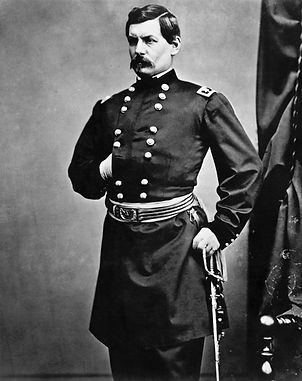
Battle of Antietam
September 17, 1862
Sharpsburg, Washington County, Maryland (Brinkley)

-
Union Commander: Major General George B. McClellan
-
objectives: his overall goal was to capture Richmond the Confederate capitol but before this battle, Lincoln ordered him to assist the Pope's forces against Lee (Brinkley)
-

-
Confederate Commander: General Robert E. Lee
-
objectives: after defeating the Pope at the Second Battle of Bull Run, he went towards Maryland with the intention of capturing the federal capitol-Washington (Britannica)
-
SUMMARY:
General Lee was advancing towards Maryland when one of McClellan's soldiers happened to find Lee's battle plans which were wrapped around some cigars abandoned by one of Lee's soldiers. Knowing Lee's plans, McClellan had a clear advantage to help him defeat them. Unfortunately, McClellan was not urgent enough in pursuing Lee's troops and missed teh oppurtunity to defeat them wholly. But McClellan's soldiers were able to use this to advance on Lee, forcing him to have to send for emergency help to come to Sharpsburg near the Antietam Creek. McClellan had a great plan but did not follow through with it fully; he attacked Lee's flanks but not in an efficient or very effective way. McClellan also thought that Lee's army outnumbered his own (which was not true at all) so he did not use all of his soldiers in the fear of losing them all and not having any for a surprise attack with soldiers Lee did not even hav. Despite that, this battle was one of the bloodiest battles in America. By the next day, Lee retreated and the Union had won.

WINNER?
-
technically a victory for the Union because Lee was forced to flee but McClellan missed his opportunity to defeat a lot more of the Confederate army and as a result was later removed from being general by Lincoln (Brinkley)
INFORMATION SOURCES
-
McPherson, James M. "The Battle of Antietam: A Turning Point in the Civil War." The Gilder Lehrman Institute of American History. Gilder Lehrman
Institute of American History, n.d. Web. 17 Jan. 2016.
<https://www.gilderlehrman.org/history-by-era/american-civil-war/essays/
battle-antietam-turning-point-civil-war>.
-
"Battle of Antietam". Encyclopædia Britannica. Encyclopædia Britannica Online.
Encyclopædia Britannica Inc., 2016. Web. 18 Jan. 2016
<http://www.britannica.com/event/Battle-of-Antietam>.
-
Brinkley, Alan. The Unfinished Nation: A Concise History of the American People. 6th ed. Boston: McGraw Hill, 2004. Print.
PICTURE SOURCES:
IMPORTANCE/CONSEQUENCES:
-
turning point of the war- due to the next couple reasons
-
Lincoln announced that the "Emancipation Proclamation" would be in effect starting January 1st, 1863 unless the Confederate states rejoined the Union (McPherson)
-
influenced Great Britain to not recognize the Confederacy as independent (Britannica)
-
France did not recognize the Confederacy as independent bc Britain didn’t (McPherson)
-
London also did not recognize the Confederacy, Antietam ruined any chances for foreign intervention in the Civil War